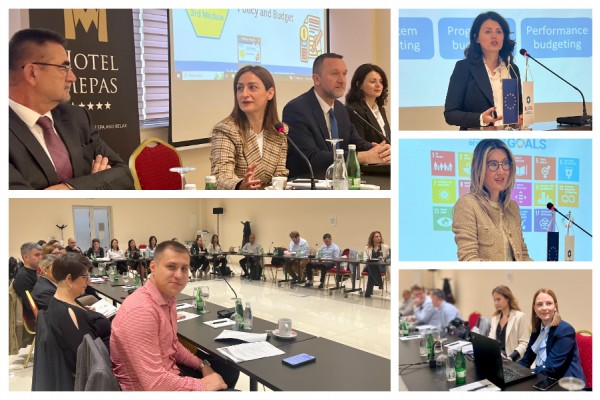
3rd Module of the Regional Academy on the Evidence-Based Policymaking Process Delved Into Realms of Costing and Budgeting
2-5 April 2024, Mostar, Bosnia and Herzegovina
In its mission to empower Western Balkan public administrations and enhance their role in policy development, the Regional Academy on Evidence-Based Policymaking tackles essential methodologies and tools crucial for effective policy planning and implementation. The first module, held in Novi Sad, Serbia, addressed fundamental elements of policymaking, while the second, in Bar, Podgorica, delved into the intricacies of monitoring and evaluating public policies.
Over four intensive days during the Third Module, 43 civil servants — comprising mid to senior-level professionals experienced in policymaking and budgetary matters — together with respected experts, actively engaged in:
- Gaining a deeper understanding of the interplay between policy and budget planning processes,
- Recognizing the significance of financial planning for the efficient implementation of policies,
- Acquiring knowledge of and, to a certain extent, applying tools for costing and budgeting policy documents,
- Familiarising with practical examples from policy development and coordination and budgeting practices in Bosnia and Herzegovina.
Esteemed experts provided invaluable insights and guidance throughout the first day of the Module. Azra BEĆIROVIĆ explained how budgeting enhances the capacity of public administrations to achieve policy objectives within financial constraints. Tanja LUČIĆ and Daria SOFTIĆ KADENIĆ shed light on the public policy cycle in Bosnia and Herzegovina, both at the state and cantonal levels. Marko Martić explored budget transparency in BiH and the wider Western Balkans, focusing on the roles of governments and civil society.
The second day delved into legal drafting, regulatory impact assessment (RIA) and the Fiscal impact assessment (FIA), presented by Erik AKSE, expert, while expert Mojmir MRAK discussed the cost of European Integration.
The third day focused on indicative financial plans in sectoral strategic planning, presented by Irena KISIĆ-PLAVŠIĆ, and Haris ABASPAHIĆ introduced the ReSPA Methodological Guide for Costing Government Strategies. Through group work led by experts Haris Abaspahić and Azra Bećirović, participants engaged in practical exercises on the cost of action plans.
On the final day, Andres PONSE MORALES and Nermin KUJOVIĆ from the International Budget Partnership (IBP) presented the findings of the Open Budget Survey, focusing on the Western Balkans case. Femke Polman showcased advanced practices from the Netherlands, while Katja LAUTAR shared Slovenia's experiences. Bojana CRNADAK highlighted the work of the Center of Excellence in Finance, providing a comprehensive overview of efforts to strengthen financial management in the region.
“The overarching goal of the Academy is to strengthen further the capacity of civil servants in the area of evidence-based policymaking and to deepen civil servants' knowledge about methods and tools that can make complex policy planning more efficient and effective, while each of the modules has its specific objectives. The presentations and exercises in this module devoted to policy costing and budgeting were successful. This important segment of policy development raised the real attention of the participants, and their commitment was worthy of praise”, said Dragan ĐURIĆ, Programme Manager at ReSPA.
The fourth Module of the Academy, scheduled in autumn in North Macedonia, will tackle the aspects of digitalisation in improving the role of public administration in developing and implementing public policies.



